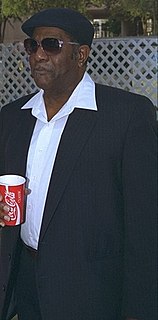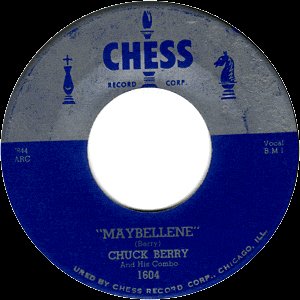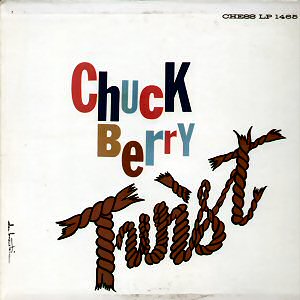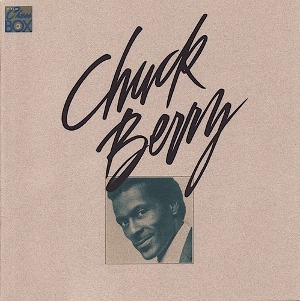Related Research Articles

Charles Edward Anderson Berry was an American singer, songwriter and guitarist, and one of the pioneers of rock and roll music. Nicknamed the "Father of Rock and Roll", he refined and developed rhythm and blues into the major elements that made rock and roll distinctive with songs such as "Maybellene" (1955), "Roll Over Beethoven" (1956), "Rock and Roll Music" (1957) and "Johnny B. Goode" (1958). Writing lyrics that focused on teen life and consumerism, and developing a music style that included guitar solos and showmanship, Berry was a major influence on subsequent rock music.

Johnnie Clyde Johnson was an American pianist who played jazz, blues and rock and roll. His work with Chuck Berry led to his induction into the Rock and Roll Hall of Fame. He was posthumously awarded the Congressional Gold Medal for breaking racial barriers in the military, as he was a Montford Point Marine - where the African-American unit endured racism and inspired social change while integrating the previously all-white Marine Corps during World War II.

Chess Records was an American record company established in 1950 in Chicago, specializing in blues and rhythm and blues. It was the successor to Aristocrat Records, founded in 1947. It expanded into soul music, gospel music, early rock and roll, and jazz and comedy recordings, released on the Chess and its subsidiary labels Checker and Argo/Cadet. The Chess catalogue is currently owned by Universal Music Group and managed by Geffen Records.

"Johnny B. Goode" is a 1958 rock-and-roll song written and first recorded by Chuck Berry. The song was a major hit, peaking at number two on Billboard magazine's Hot R&B Sides chart and number eight on its Hot 100 chart.

"Rock and Roll Music" is a song written and recorded by Chuck Berry. It has been widely covered and is one of Berry's most popular and enduring compositions.

"Roll Over Beethoven" is a 1956 hit single written by Chuck Berry, originally released on Chess Records, with "Drifting Heart" as the B-side. The lyrics of the song mention rock and roll and the desire for rhythm and blues to replace classical music. The title of the song is an imperative directed at the composer Ludwig van Beethoven to roll over out of the way and make room for the rock and roll music that Berry was promoting. The song has been covered by many other artists, including the Beatles and the Electric Light Orchestra. Rolling Stone magazine ranked it number 97 on its list of the "500 Greatest Songs of All Time".

"Maybellene" is a rock and roll song. It was written and recorded in 1955 by Chuck Berry, adapted in part from the Western swing fiddle tune "Ida Red". Berry's song told the story of a hot rod race and a broken romance, the lyrics describing a man driving a V8 Ford and chasing his unfaithful girlfriend in her Cadillac Coupe DeVille. It was released in July 1955 as a single by Chess Records, of Chicago, Illinois. Berry's first hit, "Maybellene" is considered a pioneering rock and roll song. Rolling Stone magazine wrote of it, "Rock & roll guitar starts here." The record was an early instance of the complete rock and roll package: youthful subject matter; a small, guitar-driven combo; clear diction; and an atmosphere of unrelenting excitement.
"You Can't Catch Me" is a song written and recorded by Chuck Berry, released as a single in 1956.

After School Session is the debut album of Chuck Berry, released in May 1957 on Chess Records. With the exception of two tracks, "Roly Poly" and "Berry Pickin'", all selections had been previously released on 45 rpm singles. It is the second long-playing album released by the Chess label.

Hail! Hail! Rock 'n' Roll is an album by Chuck Berry and soundtrack to the film of the same name, which was released in 1987 under record label, MCA. The album was recorded live at The Fox Theatre, St Louis, Missouri and Berry Park, Wentzville, Missouri on October 6 and October 16, 1986. The event was held to celebrate Berry's 60th birthday and it included several special guests. The album does not include the Berry song "School Days," which includes the line the album's title is derived from.

Chuck Berry Twist is the first compilation album by Chuck Berry, released by Chess Records in February 1962, during Berry's imprisonment. The title was an attempt to capitalize on a new dance craze, the Twist, introduced by Chubby Checker in 1960, even though none of the songs musically conformed to the Twist style. The album was reissued a year later with a new title, More Chuck Berry. An album with that title was released in the UK by Pye International Records in 1964, featuring the same cover but a completely different track listing.
"School Days" is a rock-and-roll song written and recorded by Chuck Berry and released by Chess Records as a single in March 1957 and on the LP After School Session two months later. It is one of his best-known songs and is often considered a rock-and-roll anthem.

Chuck Berry's Golden Decade is a compilation of music by Chuck Berry, released in three volumes in 1967, 1973, and 1974. Covering the decade from 1955 to 1964, each volume consists of a two-LP set of 24 songs recorded by Berry. The first volume reached number 72 on Billboard's Pop Albums chart. The second volume peaked at number 110. The third volume, which included only two hit singles among its tracks, did not chart.
"Brown Eyed Handsome Man" is a rock and roll song written and recorded by Chuck Berry, originally released by Chess Records in September 1956 as the B-side of "Too Much Monkey Business." It was also included on Berry's 1957 debut album, After School Session. The song title was also used as the title of a biography of Berry.
"Let It Rock" is a song written and recorded by rock and roll pioneer Chuck Berry. Chess Records released it as single, which reached number 64 on the U.S. Billboard Hot 100 chart in February 1960. Chess later added it to Berry's album Rockin' at the Hops (1960). In 1963, Pye Records released it as a single in the UK, where it reached number six.

"Nadine " is a song written and recorded by Chuck Berry. It was released as a single in February 1964 and was the first music that Berry released after finishing a prison term in October 1963.

The Chess Box is a compact disc box set compilation by Chuck Berry. It is one in a series of box sets issued by MCA/Chess in the late 1980s. The Chuck Berry set is the most prominent of these, having won a Grammy Award for Best Historical Album in 1989. Berry's Chess Box was reissued on vinyl in 1990.
"Carol" is a song written and recorded by Chuck Berry, first released by Chess Records in 1958, with "Hey Pedro" as the B-side. The single reached number 18 on Billboard's Hot 100 and number nine on the magazine's R&B chart. In 1959, it was included on his first compilation album, Chuck Berry Is on Top.
"No Money Down" is a song written and recorded by Chuck Berry in December 1955. The recording session at Universal Recording Corporation was organized by Chess Records following the success of "Maybellene" and "Wee Wee Hours" singles the same year. "No Money Down" was first released as a single in January 1956, with "Down Bound Train" on the B-side, reaching number 8 in the Billboard R&B chart. The song was later included into Chuck Berry's 1957 album After School Session.
References
- ↑ "The Chuck Berry Database: Details For Recording Session: 21. 5. 1955". A Collector's Guide to the Music of Chuck Berry. Dietmar Rudolph. Retrieved 28 September 2021.
- ↑ Whitburn, Joel (1988). "Chuck Berry". Top R&B Singles 1942–1988. Menomonee Falls, Wisconsin: Record Research. p. 41. ISBN 0-89820-068-7.
- 1 2 Altman, Billy (1988). Chuck Berry: The Chess Box (Box set booklet). Chuck Berry. Chess/MCA Records. p. 5. CH3-80,001.
- ↑ "I wanted to play the blues ... But I wasn't blue enough. We always had food on the table." Rolling Stone (April 7, 2011). "The 500 Greatest Songs of All Time". Rolling Stone . Retrieved June 17, 2011.
- ↑ "Live at the Toronto Peace Festival 1969 - Chuck Berry | Songs, Reviews, Credits". AllMusic . Retrieved May 30, 2021.
- ↑ "Hail! Hail! Rock 'n' Roll - Chuck Berry | Songs, Reviews, Credits". AllMusic . Retrieved May 30, 2021.